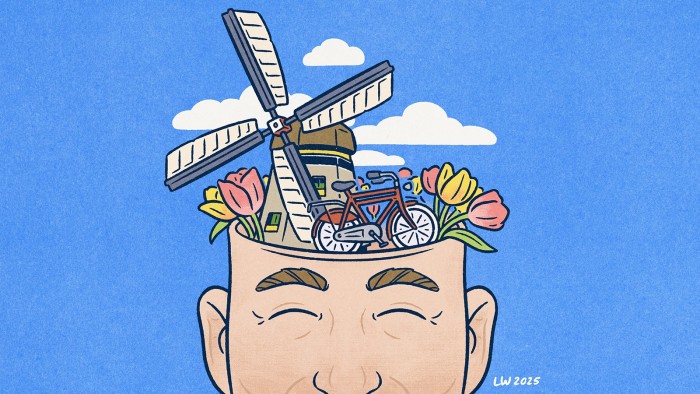Stay informed with free updates
Simply sign up to the Life & Arts myFT Digest — delivered directly to your inbox.
When I close my eyes and think back to my childhood in the Netherlands, I am nine years old and a friend and I are cycling at top speed down our town’s high street, re-enacting the finish of the Tour de France. He pulls a metre ahead of me and raises both arms in triumph for the imaginary cameras. Lord knows where our parents were.
A recent Unicef report repeats the organisation’s usual finding that Dutch children are the happiest in the rich world. Unicef ranks the Netherlands number one for mental health and fourth for physical health, though only a modest 11th for “skills”.
The country is a role model in an era when children internationally are becoming unhappier, more overweight and (academically at least) dumber. British kids report poor mental health, Americans have disastrous physical health, while Unicef’s report is littered with shocking nuggets, such as New Zealand’s youth suicide rate. Given that mental health and obesity began worsening internationally in the early 1990s, Unicef doesn’t think phones or social media are the prime culprit. “Screen time is not the most useful indicator,” the report finds.
So what makes a good childhood? And what can other countries learn from the Netherlands?
So much starts with the bike. The Dutch built cycling infrastructure that allows kids to get around their neighbourhoods alone, safely. On their bicycles, and in local playgrounds, parks and the country’s profusion of sports clubs (where I spent half my childhood), they get exercise, which Unicef says correlates with higher life satisfaction. Only 18 per cent of Dutch children are overweight, versus 42 per cent in the US.
The bike liberates kids from their parents and vice versa. There are few Dutch “soccer moms” chauffeuring their kids around in SUVs all day. Yet Dutch kids speak to their parents often, something that Unicef thinks is “strongly positively associated with life satisfaction” and much less common in, say, Japan. Crucially, Dutch parents have time to talk, because the country’s average work week is just 30 hours, the lowest of any rich nation (or, I suspect, of any society since our ancestors made the mistake of swapping leisurely hunter-gathering for back-breaking farming 12,000 years ago).
Dutch adults also have time to cook healthy family meals. Helpfully for communication, they tend to be non-judgmental pragmatists on matters like sex and drugs. Kids just don’t have much to rebel against. My Tour de France friend still frequently sees his mother, now 92.
Talking to parents and going around the neighbourhood, Dutch kids learn social skills. Eighty-three per cent say they make friends easily at school, and they report relatively little bullying (a big problem in Britain).
Something else that helps: Dutch schools aren’t that demanding. Childhood in the US, UK, Japan or South Korea is often dominated by the stress of trying to get into a top university that selects the future elite. The brutal truth may be that, taken across whole societies, there’s a negative correlation between children’s academic excellence and good mental health. Japan and Korea rank in Unicef’s top three for academic proficiency, with Ireland, while the UK is fifth — and all these countries do badly on mental health.
It’s more relaxing to grow up in the Netherlands, where hardly any universities are selective. The aim at high school in my day was typically to get the lowest passing grade, 6 out of 10. There was no reward for doing better. The academic level of Dutch kids remains unremarkable, especially since the pandemic.
The country’s elite is selected mostly in adulthood, rather than around age 17 like in the US or UK. Even in adulthood, it’s a society with quite modest prizes for winners, which is why ambitious Dutch people often export themselves to New York or London.
On the upside, it’s a good country to be average in, and people at the bottom do relatively well. Dutch income equality is exceptionally high. I once went to interview a bus driver for disabled children in the town with the Netherlands’ lowest incomes. His house was lovely. In workplaces, the lowliest employees are often heard and can typically address the boss with the familiar “je” rather than the formal “u”.
Many societies try — occasionally successfully — to optimise for excellence or wealth. I’m pleased I grew up in a place that chose life satisfaction instead.
Email Simon at [email protected]
Find out about our latest stories first — follow FT Weekend Magazine on X and FT Weekend on Instagram
